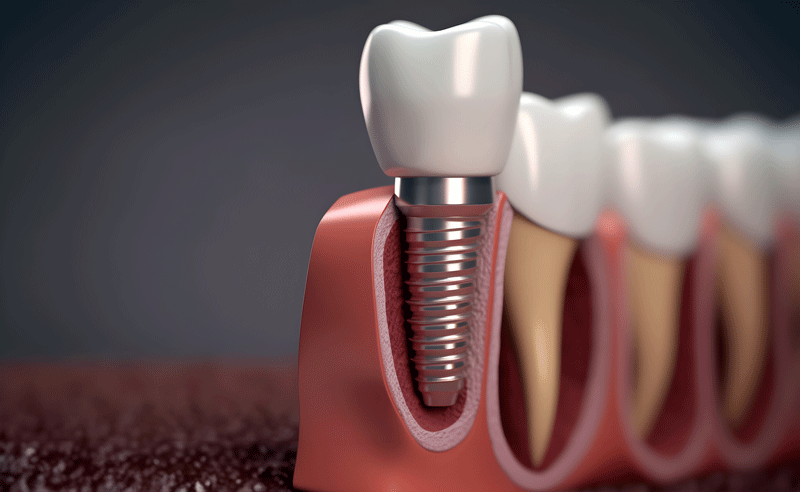Dental implants have revolutionized modern dentistry, offering a permanent solution for missing teeth. Unlike traditional dentures or bridges, implants integrate with the jawbone, providing strength, durability, and a natural appearance. For those considering this Dental Implants in Dubai, understanding the procedure, benefits, and post-care is essential.
What Are Dental Implants?
A dental implant is a titanium post surgically placed into the jawbone to act as a replacement root for a missing tooth. Over time, the implant fuses with the bone, creating a sturdy foundation for a dental crown, bridge, or denture. This technique mimics the structure of natural teeth, ensuring long-term stability.
The Dental Implant Procedure:
The process of getting dental implants typically involves several stages, ensuring optimal results and longevity.
1. Initial Consultation and Assessment:
The journey begins with a thorough dental examination. A specialist evaluates oral health, bone density, and gum condition using X-rays or CT scans. If the jawbone lacks sufficient density, a bone graft may be necessary before proceeding.
2. Tooth Extraction (If Required):
If a damaged or decayed tooth remains in the affected area, it must be extracted before implant placement. Healing time may vary based on individual cases.
3. Bone Grafting (If Needed):
In cases where the jawbone lacks the necessary volume to support an implant, a bone graft is performed. This procedure enhances the bone structure, allowing for a successful implant integration.
4. Implant Placement:
During the surgical phase, a titanium implant is precisely positioned into the jawbone. This procedure is typically performed under local anesthesia. The implant then undergoes a healing period known as osseointegration, lasting several months, during which it fuses with the bone.
5. Abutment Placement:
Once the implant is fully integrated, an abutment is attached. This small connector piece supports the final dental restoration.
6. Crown or Prosthesis Placement:
A custom-made dental crown, bridge, or denture is affixed to the abutment. This final step restores function and aesthetics, closely resembling natural teeth.
Benefits of Dental Implants:
Dental implants offer numerous advantages, making them a preferred choice for tooth replacement.
Natural Appearance and Function: Implants look, feel, and function like real teeth, restoring confidence in one’s smile.
Long-Term Durability: With proper care, implants can last a lifetime, unlike traditional dentures that may require frequent adjustments.
Bone Preservation: Unlike bridges, which may lead to bone loss over time, implants stimulate bone growth, preserving facial structure.
Enhanced Comfort and Speech: Implants eliminate the discomfort and speech difficulties often associated with removable dentures.
Improved Oral Health: Since implants do not require altering adjacent teeth, overall dental health remains intact.
Post-Treatment Care and Maintenance:
Proper aftercare is essential for the longevity of dental implants. Following these guidelines ensures successful outcomes.
Oral Hygiene Practices: Regular brushing, flossing, and the use of antibacterial mouthwash help prevent infections.
Routine Dental Checkups: Periodic visits to a dentist allow early detection of any issues and ensure implant stability.
Avoiding Hard Foods: While implants are strong, chewing excessively hard foods can damage the restoration.
Quitting Smoking: Smoking can hinder the healing process and affect implant longevity.
Managing Discomfort: Mild discomfort after the procedure is common and can be managed with prescribed pain relievers.
Conclusion:
Dental implants provide a reliable and long-lasting solution for missing teeth. The procedure, while involving multiple steps, offers numerous benefits, including durability, aesthetic appeal, and enhanced oral function. Understanding the process and following post-care recommendations ensures a successful outcome. For those considering implants, consulting a qualified dental professional can provide personalized insights and guidance, Enfield Royal Clinic.
FAQs:
1. How long do dental implants last?
With proper care, dental implants can last a lifetime. The crown may require replacement after 10-15 years due to wear and tear.
2. Is the implant procedure painful?
Most patients experience minimal discomfort as the procedure is performed under anesthesia. Any post-surgical pain can be managed with prescribed medications.
3. Can I eat normally after getting implants?
Initially, a soft diet is recommended. Once fully healed, implants function like natural teeth, allowing a normal diet.
4. Are dental implants safe?
Yes, dental implants have a high success rate and are considered a safe and effective tooth replacement option.
5. What happens if an implant fails?
Although rare, implant failure can occur due to infection or poor osseointegration. In such cases, the implant may be removed, and the area prepared for a replacement procedure.









